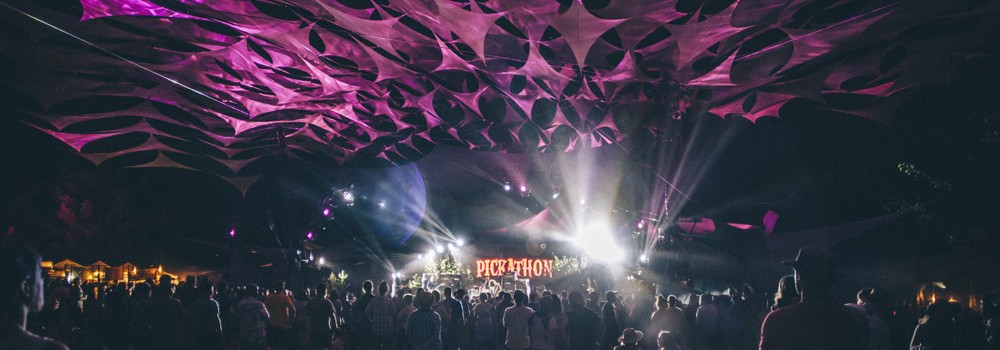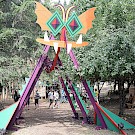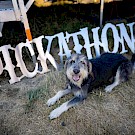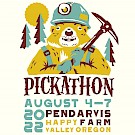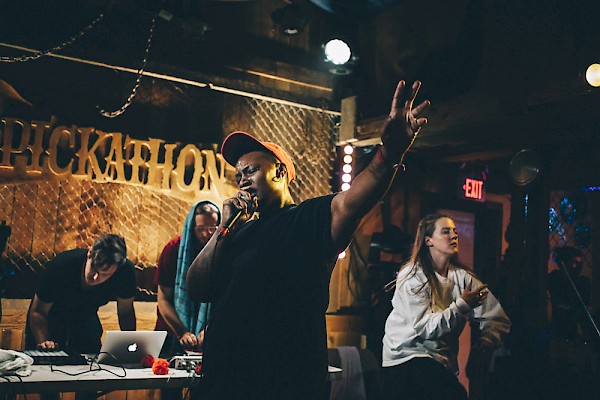 The Last Artful, Dodgr in the Galaxy Barn on August 6—click to see more photos by Sam GehrkeEvery year for the past 19 years, Pickathon acts as a tastemaker, a launching pad, and a nurturer of up-and-coming artists. This ethos goes for international performers, as well as national, but—and perhaps more importantly—also for Portland-based artists. Any regular or first-time attendee to the perennial “best weekend of the year” candidate has the opportunity to witness a dizzying cross-section of some of the most diverse and exciting artists from Portland’s renowned music community rubbing elbows with budding rock stars, and afforded the same amenities, care and attention as every other performer.
The Last Artful, Dodgr in the Galaxy Barn on August 6—click to see more photos by Sam GehrkeEvery year for the past 19 years, Pickathon acts as a tastemaker, a launching pad, and a nurturer of up-and-coming artists. This ethos goes for international performers, as well as national, but—and perhaps more importantly—also for Portland-based artists. Any regular or first-time attendee to the perennial “best weekend of the year” candidate has the opportunity to witness a dizzying cross-section of some of the most diverse and exciting artists from Portland’s renowned music community rubbing elbows with budding rock stars, and afforded the same amenities, care and attention as every other performer.
It’s a big reason why many artists return to Pickathon year after year, whether they’re performing or not (we’re looking at you, King Tuff). The emphasis on keeping the lineup locked in on emerging artists is, as Pickathon founder Zale Schoenborn admits, not a popular business model for a festival, even one of Pickathon’s modest size. It is, however, that precise business model that allows for Pickathon’s talent acquisition team to create a unique performing environment for an increasingly larger contingent of Portland artists.
“Music festivals are mostly data driven,” Schoenborn explains. “There are tastes involved, always, but there are large considerations with how you fill the place. We are definitely more irreverent than most in that world.”
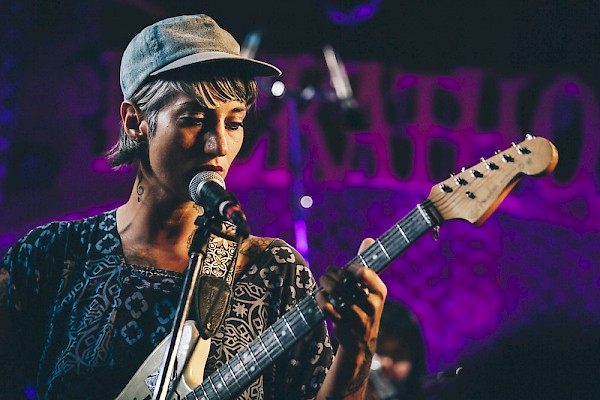 Luz Elena Mendoza of Y La Bamba in the Galaxy Barn on August 4—click to see more photos by Sam GehrkeAt this year’s Pickathon—held August 3 to 6 at Pendarvis Farm in Happy Valley, Ore.—Portland artists were featured more prominently than in the past 10 years, drawing from the city’s incendiary hip-hop scene (Mic Capes, TYuS, Jonny Cool, The Last Artful, Dodgr) to R&B (Coco Columbia, Moorea Masa & The Mood) to psych (Cat Hoch), jazz (1939 Ensemble) and beyond (Y La Bamba).
Luz Elena Mendoza of Y La Bamba in the Galaxy Barn on August 4—click to see more photos by Sam GehrkeAt this year’s Pickathon—held August 3 to 6 at Pendarvis Farm in Happy Valley, Ore.—Portland artists were featured more prominently than in the past 10 years, drawing from the city’s incendiary hip-hop scene (Mic Capes, TYuS, Jonny Cool, The Last Artful, Dodgr) to R&B (Coco Columbia, Moorea Masa & The Mood) to psych (Cat Hoch), jazz (1939 Ensemble) and beyond (Y La Bamba).
For Schoenborn, the emphasis on lineup diversity is key. The opportunity to assist emerging artists with national attention, the external benefits of live video and audio streaming, and Pickathon’s burgeoning multimedia content business arm is also a welcome byproduct of running the festival every year.
“A lot of the things that are most interesting contemporarily in various music scenes are really the folks who are putting in that creative energy and aren’t as well known yet, but are so into their music that when you see it, it blows you away,” Schoenborn says. “That tends to end up putting you in line with things that are destined for blowing up, and we definitely are lucky to have been in that stream of finding those artists over and over. These artists are really meaningful in their music worlds and are going to go on to do great things.”
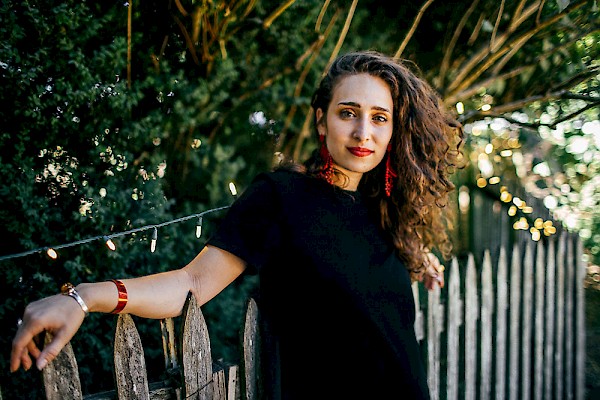 Moorea Masa at Pickathon 2017: Photo by Todd Cooper (jasontoddcooper.com)For the artists themselves, being able to perform at Pickathon is often the fulfillment of a dream. Moorea Masa’s two performances with her band The Mood at this year’s fest came on the heels of having performed in 2015 with Ural Thomas & The Pain. To be invited back to perform with her own outfit, she says, was an honor.
Moorea Masa at Pickathon 2017: Photo by Todd Cooper (jasontoddcooper.com)For the artists themselves, being able to perform at Pickathon is often the fulfillment of a dream. Moorea Masa’s two performances with her band The Mood at this year’s fest came on the heels of having performed in 2015 with Ural Thomas & The Pain. To be invited back to perform with her own outfit, she says, was an honor.
“I’m actually from Portland, so it’s cool to see something for so long, and then to get picked to play,” Masa said following her set at the Lucky Barn. “I’ve always thought this festival is so well-curated. It feels really cool to be part of something with all these bands that I really love, too. A lot of my friends are here, so it feels like just getting to hang out with my friends and playing music all weekend.”
Both Schoenborn and Masa agree that the diversity in this year’s Pickathon lineup had much to do with the input they receive from various sources throughout the year. For Schoenborn, the emphasis on propping a spotlight on Portland’s hip-hop scene has been a major goal from a performance standpoint—a goal that’s been achieved more every year, with fantastic appearances in 2016 by Myke Bogan, as well as blistering sets by The Last Artful, Dodgr, TYuS and Mic Capes in 2017. Masa credits the wake of success from April’s Soul’d Out Music Festival in Portland as a turning point in the inclusion of more soul and R&B artists in 2017, as Masa, TYuS and 1939 Ensemble were each featured in both fest lineups.
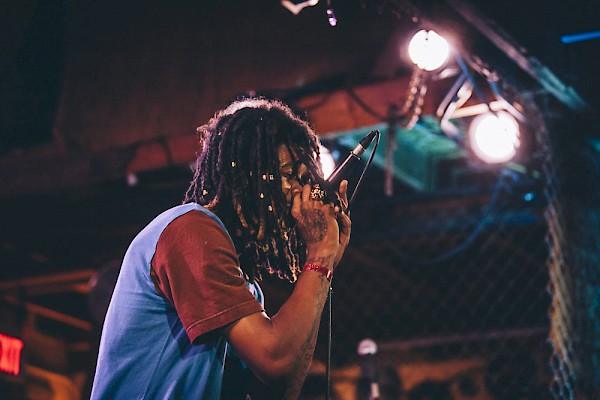 TYuS in the Galaxy Barn on August 4—click to see more photos by Sam Gehrke“Portland is a really white place, and [the Soul’d Out organizers have] been really helpful in getting more diverse groups of people out here,” Masa said. “It’s cool it can be local performers, too.”
TYuS in the Galaxy Barn on August 4—click to see more photos by Sam Gehrke“Portland is a really white place, and [the Soul’d Out organizers have] been really helpful in getting more diverse groups of people out here,” Masa said. “It’s cool it can be local performers, too.”
Even ex-Portlanders Quiet Life deserve some attention for their unique perspective. The folk-rockers called Portland home for the better part of six years, but scattered themselves across the country a couple years back. They’d attended Pickathon as guests in the past, but had yearned to be included to perform.
“We’ve played a lot of festivals and the energy here is just so different,” said vocalist and guitarist Sean Spellman following the band’s set at the Lucky Barn. “It’s very much telling of the community of artists and people generally in Portland, and the people who gravitate toward Portland. Everybody who works here is so stoked, and that makes it so much easier. All the volunteers and all the people running the festival, there’s such positivity. Even when there’s hiccups in the production of the event, it’s cool because everyone is so friendly.”
Case in point, Spellman forgot to let organizers know on the band’s tech rider that he needed an acoustic guitar to play for the weekend. Rather than lapse into despair or stress out, Schoenborn’s own father offered to loan out his one-of-a-kind, very valuable 1968 Martin acoustic for Spellman and others to use during the weekend.
“Not only did they come up with the guitar, it was from a family member of the guy running the festival, and he was glad to do it,” Spellman added. “That just epitomizes all of Pickathon.”
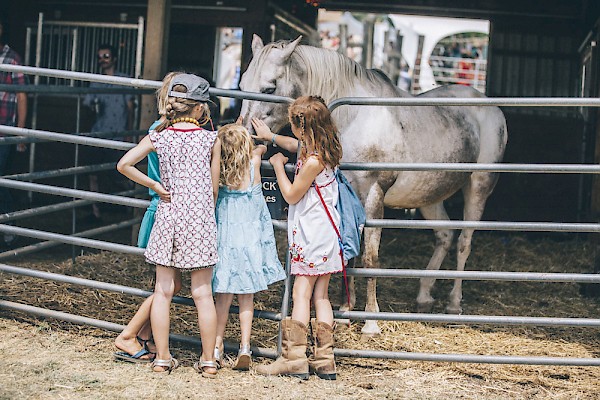 Click to see more photos from Pickathon 2017 by Sam Gehrke“In every way, we do many things wrong,” Schoenborn says. “We shouldn’t have emerging artists, but to get that energy out of the artists, and the people, and everyone involved is super important to us because you have to have that approach where you’re like, ‘This is the fantasy version of what every other festival does.’
Click to see more photos from Pickathon 2017 by Sam Gehrke“In every way, we do many things wrong,” Schoenborn says. “We shouldn’t have emerging artists, but to get that energy out of the artists, and the people, and everyone involved is super important to us because you have to have that approach where you’re like, ‘This is the fantasy version of what every other festival does.’
“After a while, all that energy you’re using to try to make something really awesome starts to pay off. It took us like 12 years of booking unknown bands that four people were excited about. That’s a crazy model for a festival. But if we had the kind of snap into the norms of how you make money at a festival, Pickathon would not be what it is.”
Schoenborn admits, too, that sometimes the injection of more Portland artists one year over another, as it seems to have been in 2017, is a “happy accident.”
“It’s true that for the artists, Pickathon very often takes them to the next level,” Schoenborn adds. “We can say we wanted to do that—it’s an awesome goal. But I think you have to do it for 12 to 15 years where you’ve done it enough that people actually attribute that to you. I have faith that if we follow the same process it’s going to lead to more of the same.”

